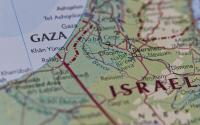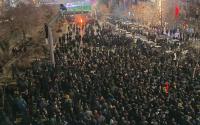Published on Monday, February 14, 2005 by Inter-Press ServiceFerry Biedermann
It was a Valentine's day massacre in front of Beirut's formerly glorious St. George hotel. Violence returned to the Lebanese capital on a scale not seen since the end of the civil war 14 years ago, and its victim was the very man who was synonymous with the country's slow emergence from that nightmare, former prime minister Rafik Hariri.
The explosion killed nine people on the well-protected Hariri's convoy, apart from the 62-year old billionaire politician.
The power of the blast was reminiscent of some of the worst outrages on Beirut's streets during the civil war between 1975 and 1990 when large numbers of people were routinely killed in bomb attacks.
Whoever was behind the attack has managed to strike at several of post-war Lebanon's most sensitive political and emotional issues. And the attack has brought the spectre of violence back to one of the few countries in the Middle East that had of late come to be regarded as quiet and relatively stable.
Many saw Hariri as the embodiment of Lebanon's post-war reconstruction effort; he owned a large share of the company responsible for the famed reconstruction of downtown Beirut. The immediate reaction among some Lebanese was that a body blow had been struck at the fragile post-war stability of the country.
Even if it never becomes clear who was behind the attack, fingers will be pointed, and the country is bound to become more polarised. Polarisation had been going on for a while already over the role of Syria in Lebanon, with pro-Syrian elements on one side and those opposing Syrian influence on the other.
The Syrians sent troops to Lebanon during the civil war on the request of the Christian-dominated government. The civil war ended with the Taif Agreement negotiated in Taif in Saudi Arabia by members of Lebanon's parliament. The agreement covered political reform, the ending of the war in Lebanon, the establishment of special relations between Lebanon and Syria, and a framework for the beginning of Syrian withdrawal from Lebanon. It was signed Oct. 22,1989.
By then Syria held sway over most of the country through its military presence, through alliances with militias such as the Hezbollah movement in the south, or through the control that its security services exerted.
Under the Taif agreement, Syria was to have withdrawn its troops and curtailed its influence in Lebanon, but it never completely did either. This led to resentment among the Christian minority but also among large segments of the Muslim population.
Things came to a head last summer when Damascus forced the Lebanese parliament in an act of naked interference to re-appoint the unpopular pro-Syrian president Emil Lahoud for another two years. This led to United Nations Security Council resolution 1559 that demands total withdrawal of Syrian troops from the country and stipulates an end to Syrian meddling in Lebanon.
Hariri was prime minister at the time, and opposed the move to re-appoint Lahoud, with whom he had clashed frequently. But the Syrian leadership forced him to back down. Several months later, he resigned.
Hariri had of late become one of the most powerful and influential critics of the role of Syria in his country..
Hariri previously had good relations with Damascus. He had many contacts in Saudi Arabia, also among the royal family. These helped smooth the way with the Syrians. Now, however, Hariri was for the first time directly opposed to the Syrians in the run-up to parliamentary elections that were expected in May. He was said to have had a good chance of leading the opposition to victory on an anti-Syrian ticket.
This makes it likely that the fingers will point at the Syrians or their proxies. The theory that opponents of Damascus did it to create chaos and force the Syrians out seems far-fetched. They stood a good chance of striking a serious blow at the Syrians at the ballot box, and did not need such a throw of the dice at this point.
Also, the May elections have been thrown into doubt now because the violence would afford Lahoud a perfect excuse to cancel them.
The European Union has already recognised this threat to Lebanon's democratic process, and has called for the elections to be held as scheduled.
In the short term the effect of the assassination may be to strengthen Syria's hand. Lahoud has authority over the army. The Syrians can also use the unrest to say that Lebanon is still unstable and therefore in need of continued Syrian presence. This has been a tactic in the past.
France has called for an international inquiry into the attack but that is unlikely. It is doubtful in any case that investigators will be able to untangle Lebanon's Byzantine political and militia scene.
For Lebanon the blast means a throwback to an earlier, uglier time.. Uncertainty and tensions along political and sectarian lines will once again increase. Foreign investment, crucial for a country as burdened with debt as Lebanon, is also likely to suffer.
Internationally, the pressure on Syria is now likely to grow. There was already rare consensus between Europe and the United States on this issue. Now that will only be strengthened, and may lead to concrete action in the form of sanctions.
Syria is already the target of U.S. sanctions under the 'Syria Accountability Act' that calls for Damascus to stop supporting terrorist groups. Washington is also upset with the Syrians over alleged support to militant groups in Iraq. Such actions may come to a head now sooner than had been expected.
http://www.commondreams.org/cgi-bin/print.cgi?file=/headlines05/0214-05.htm






